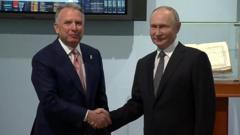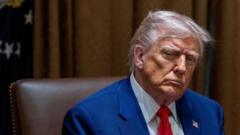The European Union is strategically recalibrating its approach to global trade in response to President Trump's tariff-based reforms. President Ursula von der Leyen is forging new trade agreements and encouraging cooperation among EU nations to ensure Europe's economic resilience and less dependency on the U.S., focusing on a larger global market perspective.
Europe Reinvents Trade Strategy Amid Trump's Economic Reforms

Europe Reinvents Trade Strategy Amid Trump's Economic Reforms
As President Trump seeks to overhaul global trade with new tariffs, the European Union, led by Ursula von der Leyen, rallies to strengthen its position and independence within international trade.
In an era when President Trump is actively seeking to reshape international trade dynamics through a series of tariffs, the European Union (E.U.) is staking its claim to be at the forefront of this evolving landscape. President Ursula von der Leyen’s leadership is pivotal as she aims to fortify Europe’s position in global commerce and reduce its reliance on the United States amid uncertainty.
The E.U., being one of the largest economic entities worldwide, recognizes the necessity of adapting to significant shifts in the trade environment. With a robust trading system that has traditionally benefitted from the exchange of automobiles, pharmaceuticals, and machinery, Europe is strategically pursuing deeper trade partnerships, not only within its member states but also on a global scale.
Von der Leyen's engagement with international leaders over recent weeks underscores the urgency of this strategic pivot. The discussions aimed at not just enhancing existing trade agreements but also fostering new ones reflect an understanding that the E.U.'s economic stability hinges on the ability to innovate and navigate through the tumult of U.S. trade politics. High levels of bilateral trade with the U.S. have made Europe aware of the risks associated with unilateral American economic maneuvers.
Moreover, the E.U. is positioning itself carefully in relation to China to prevent economic disruption from cheap imports flooding its markets as Beijing's access to U.S. consumers wanes due to Trump's tariffs. The focus remains firmly on constructive dialogue and regulations that protect the European market and ensure competitiveness.
As emphasized by Maros Sefcovic, the E.U.’s trade commissioner, understanding the broader context of global trade is crucial. He noted that while the U.S. consumer market might account for 13 percent of global goods trade, the remaining 87 percent still offers substantial opportunities for growth. This perspective is not just about maintaining economic strength; it's a broader vision for a balanced and sustainable global trading system that benefits all involved nations.
As the international trading system navigates this period of volatility, the E.U.'s proactive approach exemplifies a commitment to shaping a future where it can thrive independently while fostering fair trade practices worldwide.























